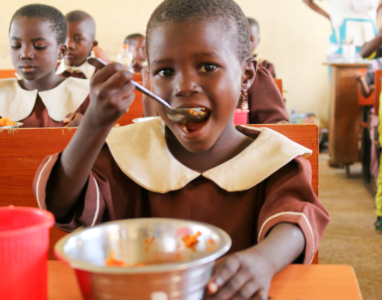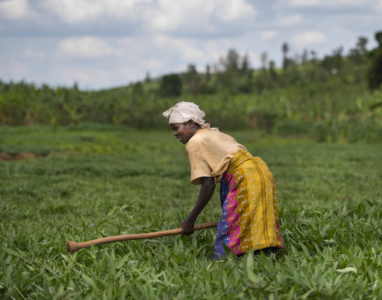
On the 11th Africa Day for Food and Nutrition Security, governments and development partners face the double challenge of coping with the COVID-19 pandemic and addressing the food insecurity and malnutrition that persists on much of the continent.
To improve efforts to tackle those challenges, the African Union (AU) convened experts from government institutions and regional and global development organizations for a virtual event on October 29. The experts participated in technical sessions and provided input for a document to present to African leaders with recommendations for reviving the region’s efforts to implement the Malabo Declaration on Accelerated Agricultural Growth and achieving the Sustainable Development Goals.
The theme of the 11th Africa Day for Food and Nutrition Security is “Resilient food systems toward healthy diets for the vulnerable during emergencies: Lessons from the COVID-19 pandemic.” The events focused on four sub themes:
- Building and sustaining resilient food systems in Africa.
- Scaling-up toward mitigating and preventing chronic malnutrition during and after the COVID-19 pandemic.
- Leveraging evidence-based, innovative interventions to create impact in food and nutrition security.
- Promoting traditional and indigenous knowledge to enrich Africa’s diets and food systems.
On the topic COVID-19 in the second session, panelists cited the pandemic’s impact on the continent’s food systems and the need for programs to strengthen food and nutrition security.
Edward Addai, UNICEF representative to the AU and United Nations Economic Commission for Africa, noted that among other things, COVID-19 has exacerbated major crises that African farmers were already grappling with before the pandemic, such as droughts or the desert locust invasion. It has also disrupted the delivery of nutrition, health and other services that vulnerable populations depend on.
“Malnourishment is rising under COVID-19. Without urgent actions, it could have inter-generational impacts,” Addai warned.
Joyce Maru, Sweetpotato Program Coordinator at the International Potato Center (CIP), stressed the importance of making Africa’s food systems more resilient and diverse.
“COVID-19 has forced us to think a notch higher about the resilience we need to create as we build back better,” Maru said.

She explained that CIP is applying lessons learned in past work with farmers and communities recovering from droughts or cyclones. She noted that short-cycle crops, such as potato or sweetpotato varieties that are ready to harvest 90-120 days after planting, can be life savers in crisis situations.
“COVID-19 has taught us that we need to act with speed and urgency to increase the availability of diverse and nutrient-dense foods that can help nourish people when the food supply is depressed,” Maru said.
Christiane Rudert, Regional Nutrition Advisor for UNICEF, explained that the pandemic has caused the food and nutrition status of vulnerable populations to deteriorate, largely because of rising food prices and the interruption of services, such as prenatal care or the distribution of vitamin A supplements. She noted that the situation is predicted to get worse in 2021 and urged governments to ensure the continuity of nutrition interventions, and to scale them up while taking steps to protect staff and beneficiaries through the use of remote platforms for training, counseling or monitoring.
“We need to seize opportunities that COVID-19 creates to move beyond ‘business as usual’ and build better bridges between programs and emergency responses,” Rudert said.
Magdalena Moshi, Deputy Director of the United Nations World Food Programme‘s Africa Global Office, stressed that in a crisis like the current pandemic, it is vital to ensure that the food and nutrition needs of vulnerable populations are met by linking nutrition-sensitive agriculture programs with safety nets such as school meals or cash transfers.
“With the closing of schools and movement restrictions, children have lost access to school meals, affecting their nutrition, especially for girls,” Moshi said.
Both Moshi and Addai mentioned the importance of African governments to secure funding to improve and expand their social protection systems in this time of crisis, and to transform food systems to ensure their populations have sustainable access to affordable, nutritious food in the future.
“Investing in resilient food systems is essential,” Addai said. “Unless we build resilient systems, we won’t survive future shocks.”
